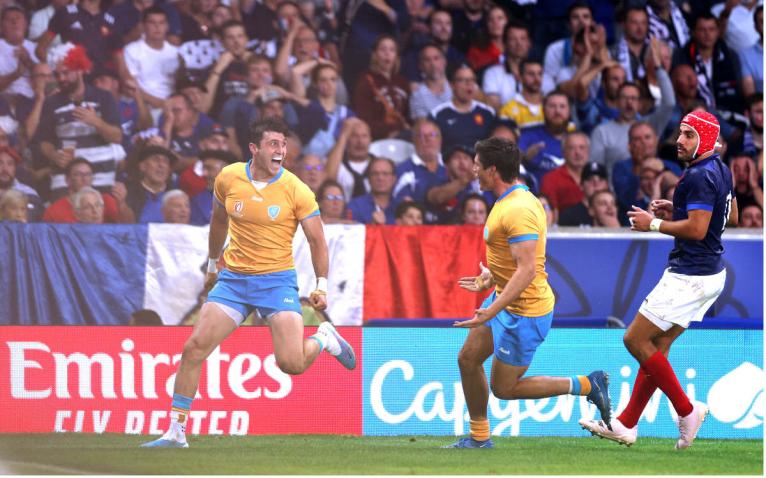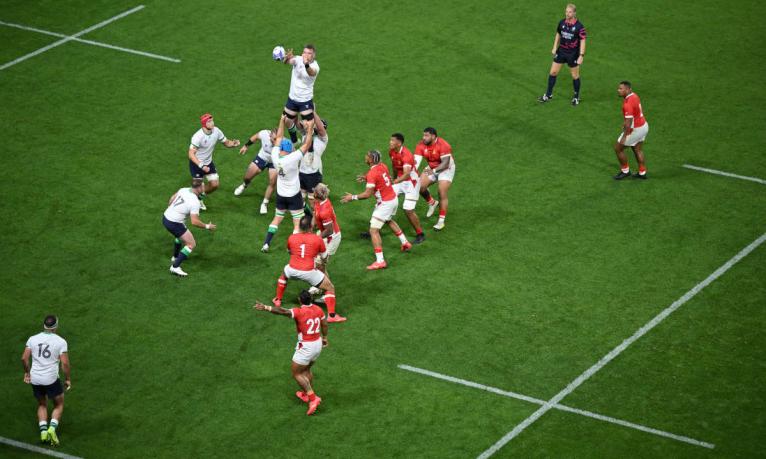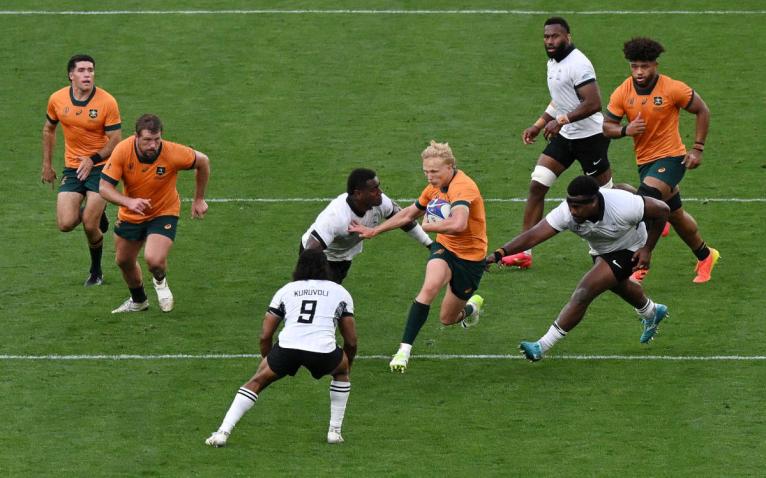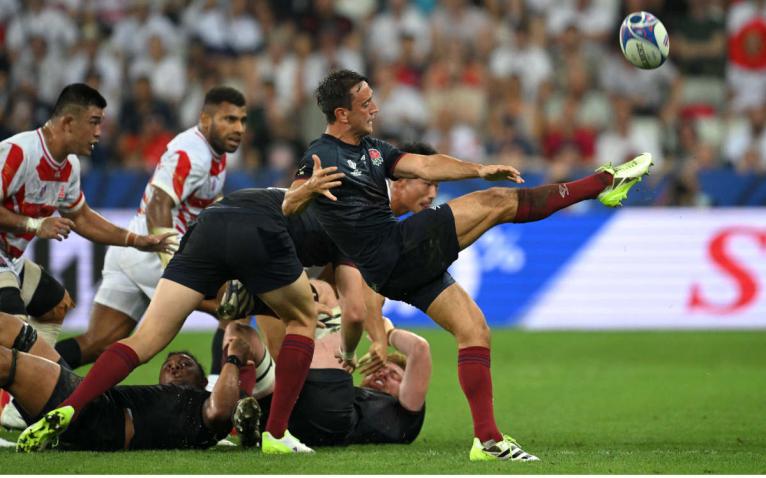Say what you like about Rugby World Cups but they’re ideal for brushing up on your flora and fauna. Southern lapwings from Uruguay (Los Teros), Andean vultures from Chile (Los Condores), Iberian wolves from Portugal (Os Lobos) to say nothing of your – by now almost domesticated – Wallabies, Pumas and Springboks. Welcome to the rugby zoo.
Namibia, though, are the real education, not least for the botanists among us; the Welwitschias isn’t exactly the snappiest of sobriquets but, given that a welwitschia is, and I quote, ‘a monotypic genus of gymnosperm’, the nickname is a clear improvement. It’s ‘the onion of the desert’, supposedly; a dog ugly, four-square plant which – symbolically – never dies and can survive in the toughest terrain for, literally, a thousand years. Good luck scrummaging against that.
But, Namibia notwithstanding, it was Uruguay and Portugal who caught the eye and stirred the soul on their opening sorties in this World Cup; Uruguay getting right up French noses in Lille – fifty minutes in and there was only a point between them – and Portugal – free-wheeling, quicksilver, ball-juggling, breath-of-fresh-air Portugal – giving Wales about as much grief as they could handle in one evening on the French Riviera. Eighty-three minutes to finally hammer the last nails into the lid tells its own story.

Both teams were a life-affirming delight to watch; indeed if you heard a loud yelp as Portugal’s magical, no-look line-out put their first runs on the board, then, apologies; that was me. The gap is closing, so much so that bigger fish shuffling their team-sheets in the pool stages now do so very much at their own risk; indeed, it’s a little like parking in Swindon. France – Wales too – rearranged far too much furniture and, as a result, could scarcely find their way around their own living room.
Look, to some extent, the opening rounds of a World Cup demand that Head Coaches pick ’n’ mix on selection and if you’re fortunate enough to be South Africa, then, yes, you’ve the horses for that, specifically a second string which, even with four scrum-halves in it, can still stick 70 on the scoreboard and concede bugger all.
Ireland, at their very best, are a symphony – perhaps more Beethoven than Mozart – who unfailingly remind you what all those crotchets and quavers can sound like when they’re perfectly-orchestrated.
But you need to measure your cloth here. There were those in Ireland urging Andy Farrell to rotate his team ahead of Tonga; shrewd man that he is, though, he did no such thing, a back-handed compliment to a very dangerous Tongan outfit and a ringing endorsement of the robustness of his own. It was a ballsy call and his team, to their credit, repaid him in spades.
This, though, is where Ireland are on and off the pitch. There’s not just a bullish confidence but an intelligence and cunning about this team that’s simply a joy to watch; at their very best, they’re a symphony – perhaps more Beethoven than Mozart – who unfailingly remind you what all those crotchets and quavers can sound like when they’re perfectly-orchestrated. Put it this way, in a sport that looks increasingly like draughts, Ireland are playing three-dimensional chess, the one exception being Fua Leiofi Bundellu Aki who is currently playing both simultaneously.

So for Ireland now, there’s nothing but Paris; five straight gigs Au Stade de France if they can keep their plates spinning, which’d not only get them to a World Cup Final but eclipse Coldplay who hold the record at the St Denis stadium with four. Look, it’s the very tallest of orders but if they can find a way around – and given the importance of the kicking game, above – South Africa this weekend, they’ll believe anything’s possible; what’s more they’ll probably avoid France in the quarter final. Will the mileage they’re currently putting into their front-line team come back to bite them in a month or so? Possibly. But then how else do Ireland play it given the cards the draw’s dealt them?
And, essentially, let’s be honest, we have a tournament of two halves on our hands here; the top half of the draw where the World Cup will be won and lost and the bottom half of the draw which is, ultimately, an irrelevance but, nonetheless, hugely diverting, not least Fiji blowing the doors off Pool C with the kind of dogged, forward-dominated, kick-heavy arm-wrestle of a performance for which they’ve long been famous on the World Sevens circuit. Yes, well, precisely.
It was tough to see whom exactly Eddie was trusting to steer a kindergarten of a team through the all-important final quarter of such a pivotal match.
In fairness, it was shape up or ship out and, to no one’s surprise, Fiji shaped up, not least on the floor where they stole, nicked, pinched, pilfered and robbed Australia blind. To put it bluntly, they got mugged, coughing up a criminal 18 penalties on the night and 11 of those at the breakdown where Levani Botia – the Artful Dodger in a headband – thieved absolutely everything. Trust me, there’ll have been Wallabies sitting in their dressing room after that game wondering where their jockstraps went.
Australia – let’s be honest – fell to pieces. Carter Gordon got hooked after less than 50 minutes; Nic White and James Slipper followed swiftly afterwards, this when the Wallabies are still very much in the fight. Given they’d lost their captain – Will Skelton – before the kick off, it was tough to see whom exactly Eddie was trusting to steer a kindergarten of a team through the all-important final quarter of such a pivotal match.

So, with some justification, Jones got booed yet again – ‘they should be throwing baguettes, croissants at me; I deserve whatever I get’ – but it was the Fijian Head Coach, Simon Raiwalui, who was much the more intriguing cutaway; Kiplingesque, he betrayed absolutely nothing. I swear on the final whistle – Fiji’s first win over Australia in 64 years, mind – he simply folded his spectacles like he’d just finished watching the Antiques Roadshow, plopped them in their case and, for all I know, headed to the dressing room for a herbal tea. The man must have the pulse rate of a turtle.
So as we approach the third week of rugby’s great, global jamboree, we have a bundle of games that we can already label as ‘shit or get off the pan’. Wales against Australia this week suddenly assumes existential importance for the Wallabies; likewise, Argentina and Samoa for Los Pumas. If either loses, they’re gone, a heartfelt disappointment for anyone who, like me, has married into South America and/or spent the past fortnight learning how to pronounce Nawaqanitawase.
Why is it that England find attacking so difficult? They can’t catch a crash ball; they can’t peel a line-out; they can’t finish a simple overlap. There are teams of Under-14s who can do all these things and more.
England, for their part, look to have one foot in the quarter finals despite a pig’s ear of a performance against Japan. George Orwell long since wrote that England was a dysfunctional country – ‘a family with the wrong members in control; I think that best describes it in a phrase’ – but English rugby seem to be redefining the nation’s relationship with the word, both backstage at Twickenham and here in France. At the final whistle in Nice, for example, Steve Borthwick threw bouquets to England’s ‘incredible supporters’, these being the very people who, early in the second half, roundly booed their own team as Alex Mitchell plucked priceless attacking ball out of a quick ruck and kicked it dead.
Why is it that England find attacking so difficult? They can’t catch a crash ball; they can’t peel a line-out; they can’t finish a simple overlap. There are teams of Under-14s who can do all these things and more, so why can’t England, the more so since all they’ve come up against so far is a wretched Argentina and a Japanese side who – through no fault of their own – are a shadow of the outstanding 2019 team?

George Ford at the final whistle – and I quote – said he was ‘very, very happy’ with the result and with a game-plan which was all about ‘building pressure’; seemingly, kicking the ball to establish positions where they could kick the ball some more. To be sure, God loves a trier but if your attacking game is about little more than ‘building pressure’, we all might as well forget rugby and take up geology. Who knows, eighty minutes of fractional crystallisation might yet prove more entertaining.
In the wider narrative of this World Cup, England look to be nothing more than honest extras but then, let’s face it, you could say that about anyone in the lower half of the draw. Yes, there are fixtures this coming week – Argentina/Samoa in St Etienne, Wales/Australia in Lyon, perhaps even Scotland/Tonga in Nice – which’ll more than tickle our curiosity. But the only game that’ll tell us anything in the wider scheme of things is South Africa against Ireland in Paris. For what it’s worth, stick your money on the green team. You heard it here first.



Which green team? Boks play in green too 😬. Impressively vague there Mr Simmons.
Entertaining piece!